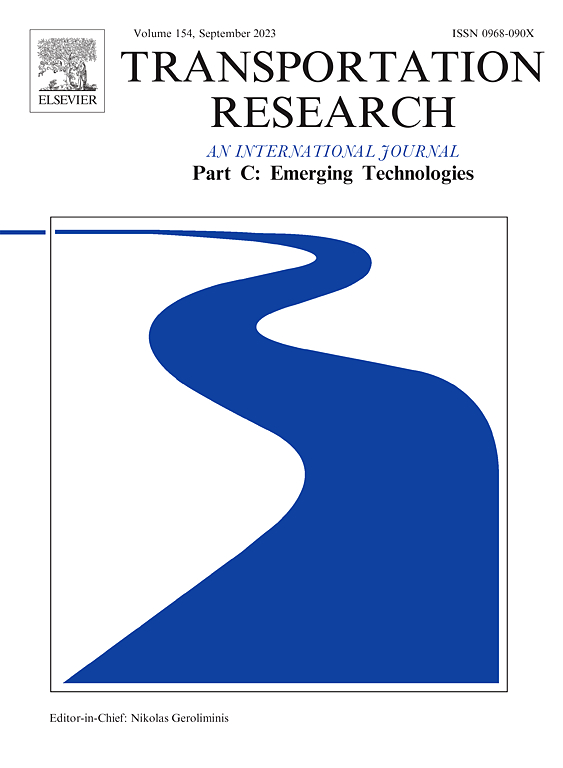基于自适应重要抽样的自动驾驶汽车自适应安全性能测试
IF 7.6
1区 工程技术
Q1 TRANSPORTATION SCIENCE & TECHNOLOGY
Transportation Research Part C-Emerging Technologies
Pub Date : 2025-07-11
DOI:10.1016/j.trc.2025.105256
引用次数: 0
摘要
高效、准确的安全测试和评估对自动驾驶汽车至关重要。最近的研究利用了先验信息,如代理模型,通过故意生成安全关键场景来提高测试效率。然而,这种先验知识与实际AV性能之间的差异可能会破坏其有效性。为了应对这一挑战,自适应测试方法基于自动驾驶汽车的后验信息(如测试结果)动态调整测试策略。现有的方法大多侧重于在预试验过程中自适应优化测试策略,而忽略了如何在大规模测试过程中调整测试策略以实现无偏安全性能评价。为了填补这一空白,我们提出了一个自适应测试框架,在大规模测试中不断优化测试策略。我们的方法通过深度学习迭代学习自动驾驶汽车动力学,并基于学习到的动力学使用强化学习优化测试策略。为了解决安全关键事件罕见性带来的挑战,我们的方法专注于动态学习和策略优化过程中的安全关键状态学习。此外,我们通过整合多个预训练的测试策略并优化它们的组合系数来增强评估的鲁棒性。为了准确评估安全性能,我们使用自适应重要性抽样来评估从各种测试策略中获得的测试结果。在超车和无保护左转弯场景下的实验验证表明,该方法具有显著的评价效率。本文章由计算机程序翻译,如有差异,请以英文原文为准。
Adaptive safety performance testing for autonomous vehicles with adaptive importance sampling
Efficient and accurate safety testing and evaluation are crucial for autonomous vehicles (AVs). Recent studies have utilized prior information, such as surrogate models, to enhance testing efficiency by deliberately generating safety-critical scenarios. However, discrepancies between this prior knowledge and actual AV performance can undermine their effectiveness. To address this challenge, adaptive testing methods dynamically adjust testing policies based on posterior information of AVs, such as testing results. Most existing approaches focus on adaptively optimizing testing policies during pre-tests, yet neglecting how to adapt the testing policies in the large-scale testing process that is required for unbiased safety performance evaluation. To fill this gap, we propose an adaptive testing framework that continuously optimizes testing policies throughout large-scale testing. Our approach iteratively learns AV dynamics through deep learning and optimizes testing policies based on the learned dynamics using reinforcement learning. To tackle the challenge posed by the rarity of safety-critical events, our method focuses exclusively on learning safety-critical states in both the dynamics learning and the policy optimization processes. Additionally, we enhance evaluation robustness by integrating multiple pre-trained testing policies and optimizing their combination coefficients. To accurately assess safety performance, we evaluate testing results obtained from various testing policies using adaptive importance sampling. Experimental validation in overtaking and unprotected left-turn scenarios demonstrates the significant evaluation efficiency of our method.
求助全文
通过发布文献求助,成功后即可免费获取论文全文。
去求助
来源期刊
CiteScore
15.80
自引率
12.00%
发文量
332
审稿时长
64 days
期刊介绍:
Transportation Research: Part C (TR_C) is dedicated to showcasing high-quality, scholarly research that delves into the development, applications, and implications of transportation systems and emerging technologies. Our focus lies not solely on individual technologies, but rather on their broader implications for the planning, design, operation, control, maintenance, and rehabilitation of transportation systems, services, and components. In essence, the intellectual core of the journal revolves around the transportation aspect rather than the technology itself. We actively encourage the integration of quantitative methods from diverse fields such as operations research, control systems, complex networks, computer science, and artificial intelligence. Join us in exploring the intersection of transportation systems and emerging technologies to drive innovation and progress in the field.

 求助内容:
求助内容: 应助结果提醒方式:
应助结果提醒方式:


